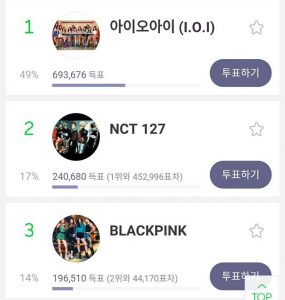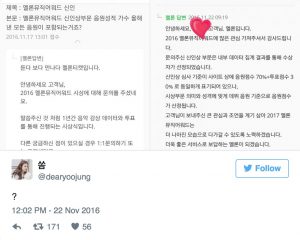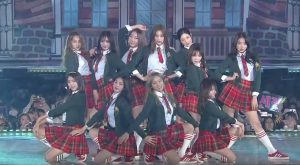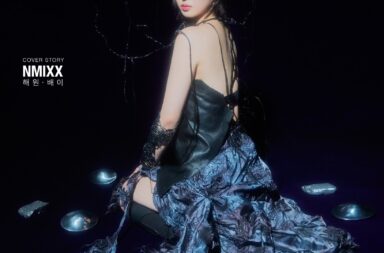 I remember one typical 4 a.m. in econometrics when my class was finishing monthly projects, and a group suddenly panicked. Their regression model just wasn’t giving them the results they had anticipated. Finally a classmate walked over and said, “Use a different model that emphasizes this variable more; then you’ll probably get the results you want.” Questionable regression analysis aside, the class was a semester in learning how to rearrange – or manipulate – all kinds of data to draw outcomes. While raw numbers may be a kind of truth, the real question has always been how these numbers should be weighed. And the subjectivity of this question is why the Melon Music Awards has now found itself in an ocean of hot water with netizens after November 19th, when it gave the Best New Artist Award to Black Pink instead of lead contender I.O.I.
I remember one typical 4 a.m. in econometrics when my class was finishing monthly projects, and a group suddenly panicked. Their regression model just wasn’t giving them the results they had anticipated. Finally a classmate walked over and said, “Use a different model that emphasizes this variable more; then you’ll probably get the results you want.” Questionable regression analysis aside, the class was a semester in learning how to rearrange – or manipulate – all kinds of data to draw outcomes. While raw numbers may be a kind of truth, the real question has always been how these numbers should be weighed. And the subjectivity of this question is why the Melon Music Awards has now found itself in an ocean of hot water with netizens after November 19th, when it gave the Best New Artist Award to Black Pink instead of lead contender I.O.I.
If this had been the Korean Music Awards, where winners are decided by a panel of industry insiders, it’s unlikely that the backlash to Black Pink’s win would be so ferocious. But the Melon Music Awards distinguishes itself by supposedly simplifying the process: the winner for Best New Artist Award is calculated with the equation of 70% digital sales and 30% online voting.
This use of hard numerical data is meant to ensure transparency and fairness, but Black Pink’s controversial win has only revealed to the public how problematic Melon’s decision-making methods have been. In terms of online voting, it was clear that I.O.I won, clocking in with 49% of the votes, compared to Black Pink’s 14%. The real contention thus lies in the digital sales, the larger (70%) chunk that decides Melon’s Best New Artist of the year.
 That brings us to the question of semantics Black Pink and I.O.I fans have been arguing over: what, exactly, are “digital sales”? Digital sales can be understood in a complex variety of ways: total number of streams in a day, average number of purchases in a day, number of days spent on sales charts, number of months spent on streaming charts. That’s not to mention which songs are being counted in digital sales: only the digital sales of lead singles, or all songs released?
That brings us to the question of semantics Black Pink and I.O.I fans have been arguing over: what, exactly, are “digital sales”? Digital sales can be understood in a complex variety of ways: total number of streams in a day, average number of purchases in a day, number of days spent on sales charts, number of months spent on streaming charts. That’s not to mention which songs are being counted in digital sales: only the digital sales of lead singles, or all songs released?
There’s room for infinite combinations and interpretations of ‘digital sales’ here, which is why netizens have been crunching their own numbers to make a case for each girl group. I.O.I fans have argued that over the course of the year, counting the sales for the whole discography of each group, I.O.I deserved to win the award. On the other hand, many Black Pink fans contend that I.O.I debuted months before Black Pink, and had more time to release more music. This means that Melon must have performed calculations to compare the ratio of the number of releases to the amount of digital sales for each group, with Black Pink coming out on top.
The real kicker is that nobody actually knows what “digital sales” are, including the Melon Music Awards. In a Twitter screenshot comparison that has now been circulated around the world and back again, we see the show representatives giving two very different answers online. On November 17th, two days before the show, ‘digital sales’ are understood to be based on “all the songs released in 2016.” Then, on November 22nd, three days after the show, a second answer is given where ‘digital sales’ are understood to be based “solely on the debut song.”
 More than anything, these conflicting answers have been incredibly damaging to the Melon Music Awards’ reputation. Upon examining solely the debut song for Black Pink and I.O.I on Melon’s charts, “Whistle” did in fact receive more downloads and streams than “Dream Girls” over the course of 2016. But it’s not clear if this evidence merits anything, given that Melon publicly changed its answer, and could have been using the data to defend itself in the aftermath of the controversy.
More than anything, these conflicting answers have been incredibly damaging to the Melon Music Awards’ reputation. Upon examining solely the debut song for Black Pink and I.O.I on Melon’s charts, “Whistle” did in fact receive more downloads and streams than “Dream Girls” over the course of 2016. But it’s not clear if this evidence merits anything, given that Melon publicly changed its answer, and could have been using the data to defend itself in the aftermath of the controversy.
The extent to which both Black Pink and I.O.I fans have been able to argue for each artist’s right to the Best New Artist Award demonstrates how painfully unclear the Melon Music Awards criteria for winning has been. By creating an illusion of fairness through a misleading equation, many netizens anticipated I.O.I to be the winner beforehand and were left unprepared when the award was officially announced for Black Pink. Ultimately, the scandal has revealed the subjectivity involved in using numerical data to make decisions, and only reinforces the stereotype of awards shows as being rigged by The Big Three (SM, YG, and JYP Entertainment), lubricated by money and shady backroom negotiations.
Readers, can you think of a more transparent way for the Melon Awards Show to decide its winners?
(Melon Music Awards, Nate [1][2], Naver [1][2], Images via Twitter, MBC)


